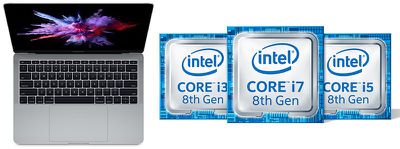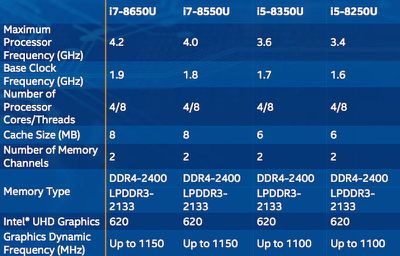Intel today introduced its eighth-generation Core processor lineup [PDF] coming to notebooks later this year.

The first four eighth-generation processors launching today are U-series chips suitable for the 13-inch MacBook Pro, MacBook Air, and Mac mini. They're all 15W chips with four cores and eight threads, paving the way for a quad-core 13-inch MacBook Pro should Apple choose to release one.
The new Core i5 and Core i7 chips have integrated Intel UHD Graphics 620, and support both DDR4-2400 and LPDDR3-2133 RAM.
Given the lack of LPDDR4 support, which allows for up to 32GB RAM, a new 13-inch MacBook Pro with an eighth-generation Core processor would likely remain capped at 16GB of RAM. Apple marketing Phil Schiller explained why last year.

Notebooks using the eighth-generation chips can get up to 10 hours of battery life, consistent with the current 13-inch MacBook Pro.
Intel said eighth-generation processors appropriate for desktops like the iMac will be available in the fall, while processors appropriate for the 12-inch MacBook and 15-inch MacBook Pro are vaguely listed as coming soon.
The eighth-generation Core i5 and Core i7 chips are up to 40 percent faster than the equivalent seventh-generation Kaby Lake processors, according to Intel, based on the benchmark tool SYSmark 2014 SE on Windows 10. That tops Intel's original claim that the chips would be up to 30 percent faster.
The test compared Intel's quad-core Core i7-8550U processor, with a base frequency of 1.8GHz and Turbo Boost up to 4GHz, against its dual-core Core i7-7500U processor with a base frequency of 2.7GHz and Turbo Boost up to 3.5GHz.
Intel also boasted that its eighth-generation Core processors are up to twice as fast as its equivalent five-year-old Ivy Bridge chips. It said users can output a 106-second 4K video in as little as three minutes with a new PC, for example, versus up to 45 minutes on an equivalent five-year-old PC.
Notably, the eighth-generation processors announced today are not part of the upcoming Coffee Lake family. Instead, they're part of what's being called Kaby Lake Refresh, an iteration of the seventh-generation Kaby Lake processors used in the latest MacBook, MacBook Pro, and iMac models.
Intel is expected to eventually announce chips based on Coffee Lake's 14nm++ and Cannonlake's 10nm manufacturing processes that join the eighth-generation Core lineup. In other words, a new generation of Core processors no longer immediately correlates to brand new chip architecture.
Intel said the first notebooks with eighth-generation Core processors will be available in September, but it's unclear when Apple will refresh its Mac lineup — probably not soon. For perspective, Intel launched its Kaby Lake processors in January, and the first Macs equipped with the chips were released in June.























